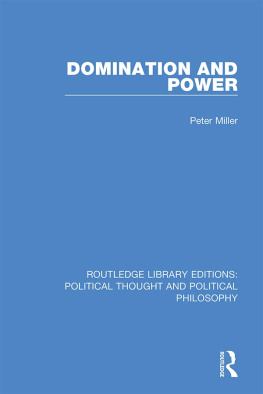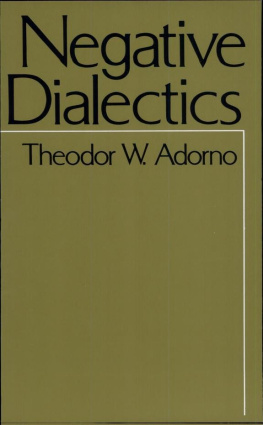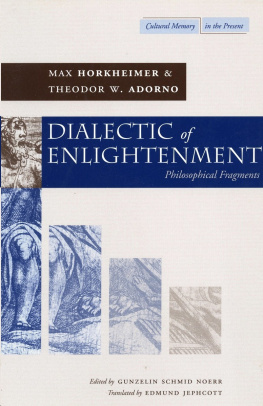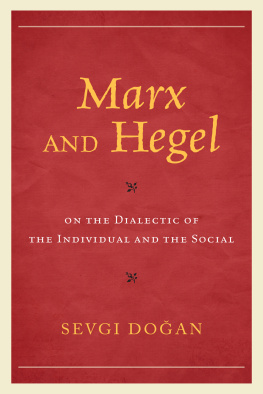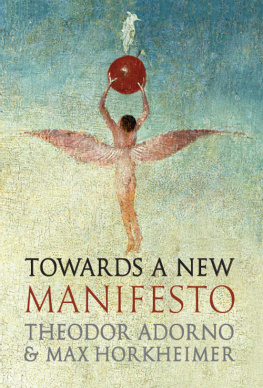Enlightenment, understood in the widest sense as the advance of thought, has always aimed at liberating human beings from fear and installing them as masters. Yet the wholly enlightened earth is radiant with triumphant calamity. Enlightenments program was the disenchantment of the world.* It wanted to dispel myths, to overthrow fantasy with knowledge. Bacon, the father of experimental philosophy,1 brought these motifs together. He despised the exponents of tradition, who substituted belief for knowledge and were as unwilling to doubt as they were reckless in supplying answers. All this, he said, stood in the way of the happy match between the mind of man and the nature of things, with the result that humanity was unable to use its knowledge for the betterment of its condition. Such inventions as had been madeBacon cites printing, artillery, and the compasshad been arrived at more by chance than by systematic enquiry into nature. Knowledge obtained through such enquiry would not only be exempt from the influence of wealth and power but would establish man as the master of nature:
Therefore, no doubt, the sovereignty of man lieth hid in knowledge; wherein many things are reserved, which kings with their treasure cannot buy, nor with their force command; their spials and intelligencers can give no news of them, their seamen and discoverers cannot sail where they grow: now we govern nature in opinions, but we are thrall unto her in necessity: but if we would be led by her in invention, we should command her by action."
Although not a mathematician, Bacon well understood the scientific temper which was to come after him. The happy match between human understanding and the nature of things that he envisaged is a patriarchal one: the mind, conquering superstition, is to rule over disenchanted nature. Knowledge, which is power, knows no limits, either in its enslavement* of creation or in its deference to worldly masters. Just as it serves all the purposes of the bourgeois economy both in factories and on the battlefield, it is at the disposal of entrepreneurs regardless of their origins. Kings control technology no more directly than do merchants: it is as democratic as the economic system* with which it evolved. Technology is the essence of this knowledge. It aims to produce neither concepts nor images, nor the joy of understanding, but method, exploitation of the labor of others,* capital. The many things which, according to Bacon, knowledge still held in store are themselves mere instruments: the radio as a sublimated printing press, the dive bomber as a more effective form of artillery, remote control as a more reliable compass. What human beings seek to learn from nature is how to use it to dominate wholly both it and human beings. Nothing else counts. Ruthless toward itself, the Enlightenment has eradicated the last remnant of its own self-awareness. Only thought which does violence to itself is hard enough to shatter myths. Faced by the present triumph of the factual mentality, Bacons nominalist c redo would have smacked of metaphysics and would have been convicted of the same vanity for which he criticized scholasticism. Power and knowledge are synonymous.1 For Bacon as for Luther, knowledge that tendeth but to satisfaction, is but as a courtesan, which is for pleasure, and not for fruit or generation. Its concern is not satisfaction, which men call truth, but operation, the effective procedure. The true end, scope or office of knowledge does not consist in any plausible, delectable, reverend or admired discourse, or any satisfactory arguments, but in effecting and working, and in discovery of particulars not revealed before, for the better endowment and help of mans life.4 There shall be neither mystery nor any desire to reveal mystery.
The disenchantment of the world means the extirpation of animism. Xenophanes mocked the multiplicity of gods because they resembled their creators, men, in all their idiosyncrasies and faults, and the latest logic denounces the words of language, which bear the stamp of impressions, as counterfeit coin that would be better replaced by neutral counters. The world becomes chaos, and synthesis salvation. No difference is said to exist between the totemic animal, the dreams of the spirit-seer,* and the absolute Idea. On their way toward modern science human beings have discarded meaning. The concept is replaced by the formula, the cause by rules and probability. Causality was only the last philosophical concept on which scientific criticism tested its strength, because it alone of the old ideas still stood in the way of such criticism, the latest secular form of the creative principle. To define substance and quality, activity and suffering, being and existence in terms appropriate to the time has been a concern of philosophy since Bacon; but science could manage without such categories. They were left behind as idola theatri of the old metaphysics and even in their time were monuments to entities and powers from prehistory. In that distant time life and death had been interpreted and interwoven in myths. The categories by which Western philosophy defined its timeless order of nature marked out the positions which had once been occupied by Ocnus and Persephone, Ariadne and Nereus. The moment of transition is recorded in the pre-Socratic cosmologies. The moist, the undivided, the air and fire which they take to be the primal stuff of nature are early rationalizations precipitated from the mythical vision. Just as the images of generation from water and earth, that had come to the Greeks from the Nile, were converted by these cosmologies into Hylozoic principles and elements, the whole ambiguous profusion of mythical demons was intellectualized to become the pure form of ontological entities. Even the patriarchal gods of Olympus were finally assimilated by the philosophical logos as the Platonic Forms. But the Enlightenment discerned the old powers in the Platonic and Aristotelian heritage of metaphysics and suppressed the universal categories claims to truth as superstition. In the authority of universal concepts the Enlightenment detected a fear of the demons through whose effigies human beings had tried to influence nature in magic rituals. From now on matter was finally to be controlled without the illusion of immanent powers or hidden properties. For enlightenment, anything which does not conform to the standard of calculability and utility must be viewed with suspicion. Once the movement is able to develop unhampered by external oppression, there is no holding it back. Its own ideas of human rights then fare no better than the older universal. Any intellectual resistance it encounters merely increases its strength.5 The reason is that enlightenment also recognizes itself in the old myths. No matter which myths are invoked against it, by being used as arguments they are made to acknowledge the very principle of corrosive rationality of which enlightenment stands accused. Enlightenment is totalitarian.
Enlightenment has always regarded anthropomorphism, the projection of subjective properties onto nature, as the basis of myth.6 The supernatural, spirits and demons, are taken to be reflections of human beings who allow themselves to be frightened by natural phenomena. According to enlightened thinking, the multiplicity of mythical figures can be reduced to a single common denominator, the subject. Oedipuss answer to the riddle of the SphinxThat being is manis repeated indiscriminately as enlightenments stereotyped message, whether in response to a piece of objective meaning, a schematic order, a fear of evil powers, or a hope of salvation. For the Enlightenment, only what can be encompassed by unity has the status of an existent or an event; its ideal is the system from which everything and anything follows. Its rationalist and empiricist versions do not differ on that point. Although the various schools may have interpreted its axioms differently, the structure of unitary science has always been the same. Despite the pluralism of the different fields of research, Bacons postulate of una scientia universalis is as hostile to anything which cannot be connected as Leibnizs mathesis universalis is to discontinuity. The multiplicity of forms is reduced to position and arrangement, history to fact, things to matter. For Bacon, too, there was a clear logical connection, through degrees of generality, linking the highest principles to propositions based on observation. De Maistre mocks him for harboring this idolized ladder.* Formal logic was the high school of unification. It offered Enlightenment thinkers a schema for making the world calculable. The mythologizing equation of Forms with numbers in Platos last writings expresses the longing of all demythologizing: number became enlightenments canon. The same equations govern bourgeois justice and commodity exchange. Is not the rule, Si inaequalibus aequalia addas, omnia erunt inaequalia, [If you add like to unlike you will always end up with unlike] an axiom of justice as well as of mathematics? And is there not a true coincidence between commutative and distributive justice, and arithmetical and geometrical proportion?9 Bourgeois society is ruled by equivalence. It makes dissimilar things comparable by reducing them to abstract quantities. For the Enlightenment, anything which cannot be resolved into numbers, and ultimately into one, is illusion; modern positivism consigns it to poetry. Unity remains the watchword from Parmenides to Russell. All gods and qualities must be destroyed.



